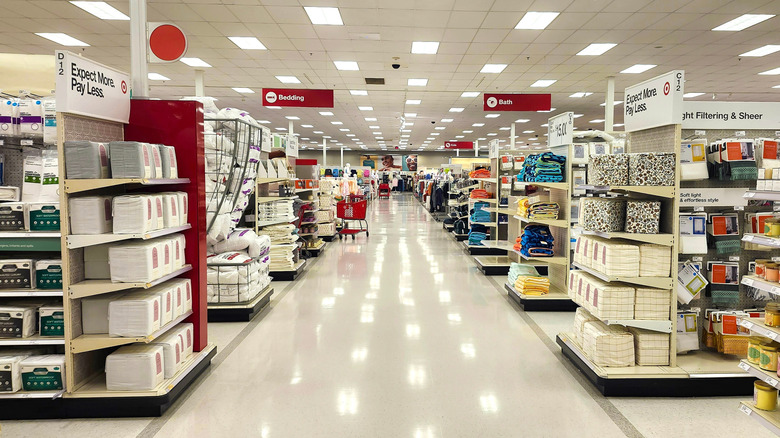Target's Warning Should Have Customers On Edge And The Reason Why Is Clear
The U.S. economy has not been faring too well this year — and many are making the claim that it's Donald Trump's fault. This is largely tied to a single economic policy he has implemented on a large scale: tariffs. Generally speaking, tariffs are meant to bolster domestic business growth and government revenue. However, Trump has also been using them as a negotiation tool in an effort to force other countries to comply with his demands. Unfortunately, this strategy hasn't been particularly successful. Instead, these tariffs are set to cause a great deal of financial strain for businesses and consumers alike. One business in particular, Target, recently warned that these tariffs would significantly hurt them financially — and that their financial pain would ultimately trickle down to customers.
Since tariffs increase prices on imported goods, businesses ultimately have to pay more to get those same products. This increased cost is then, in turn, passed on to consumers in the form of higher prices. The CEO of Target has already confirmed that the company will be increasing the price of many of their products in the near future. This combination of tariffs and the recent boycott against the company — in light of Target deciding to rollback DEI-based hiring initiatives – has significantly impacted the company's profits and is sure to continue affecting the company going forward.
How tariffs are impacting Target
Target has landed in quite the precarious financial situation due to its heavy reliance on imports from foreign countries for the majority of its products. In fact, during a Q4 2024 earnings call, Target's Chief Commercial Officer, Rick Gomez, said that the company still gets about 30% of its products from China. Given that Trump has now imposed a 54% tariff on all Chinese imports, this will undoubtedly lead to financial strain for Target. To make matters worse, Trump's on-again off-again tariff threats against Mexico and Canada create additional uncertainty for the company, which imports products from both. More specifically, Target relies heavily on produce imports from Mexico in the winter months.
Target also imports significant amounts of products from countries like Indonesia, Vietnam, and India which are now also subject to Trump's new tariffs. Indonesia faces 32% tariffs, Vietnam will be hit with 46% tariffs, and India will face a 27% tariff rate. That said, consumers should expect to see an increase in the price of various products at Target, and soon. It could be worth looking into specific money saving grocery shopping strategies or avoiding Target altogether.
The impact of boycotts against Target
Tariffs aren't the only thing causing Target to financially suffer in 2025. Many consumers are also currently boycotting the company due to its decision to roll back DEI hiring practices due to pressure from the Trump administration. Following the announcement that Target was abandoning their DEI programs in January, the retail giant has experienced an eight week decline in customer turnout, according to Fortune. That said, it should come as no surprise that Target experienced a decline in sales in February, and is now only expecting their total 2025 sales to grow around 1%. It's worth noting that the elimination of DEI practices was not mandatory, with company's like Costco openly doubling down on their diversity programs instead.
Also, before any tariff or sales related issues began, Target's stock price was already not doing well. It has been on a consistent downtrend over the last year, experiencing around a 40% decline in the last six months. However, almost half of that 40% price decline happened in March 2025 alone, with the stock down roughly 19% since early March.


